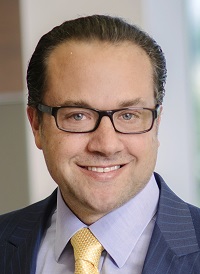The look, feel and function of the post-pandemic workplace is still uncertain, but a technology firm’s recent expansion in Jersey City is a reminder of why companies will still need office space going forward.
By Joshua Burd
Angelo Stracquatanio admits it — at first glance, it “makes no sense” that a technology firm leased 32,000 square feet of office space mid-pandemic, as Apprentice.io did in Jersey City.
But that doesn’t account for the intense growth that his company has experienced over the past 18 months, thanks to the role that its software played in manufacturing the COVID-19 vaccine. Consequently, the venture has raised three rounds of financing since the start of the health crisis, while his team has expanded six-fold during that time.

“What we found was that, when you’re going through that much growth, you can’t do it all remotely,” said Stracquatanio, Apprentice.io’s CEO and founder. “Collaboration matters a lot — and we found that, specifically, there are just some things you can’t do over Zoom. You have to be in person, you have to be collaborating, you have to use a whiteboard.
“I know that sounds obvious, but these very simple tenets that we’ve held for a long time still matter. The difference, though, is that we changed how the office looks, we changed how the office functions.”
Stracquatanio — whose space features a network of flexible, open-air collaboration zones instead of stuffy conference rooms — spoke in early November during a panel discussion hosted by NAIOP New Jersey. For those on hand, the message was both reassuring and eye-opening — and a reminder of why companies will still need office space going forward.
Exactly how that space will look is still unclear, panelists said, and how tenants use it will likely differ from one industry to the next.

“Every company is very different,” said Brian Decillis, a broker and managing director with Cushman & Wakefield. “From one end of the spectrum, companies are saying, ‘It’s got to be five days (in the office).’ Some companies are saying, ‘The remote environment works for us.’
“It feels like hybrid is here to stay for quite a while, but the office is alive and well.”
NAIOP’s event took place Nov. 1 at the MC Hotel in Montclair, with Onyx Equities’ Jonathan Schultz serving as its moderator. At the time, Decillis said “human occupancy” at New Jersey office buildings was an estimated 30 to 40 percent, as most employees continue to work remotely. He added that submarkets such as Jersey City, Short Hills and Parsippany have attracted a handful of leases from Manhattan-based companies that want their teams to be in an office, even if it’s not their main location.
“I think that markets typically overreact and I think what we’ve seen over the last year and a half is that the pendulum swung hard in one direction,” Decillis said. “People have made adjustments.”
Apprentice.io, which describes itself as an intelligent software company for life science manufacturing, announced its lease at 101 Hudson St. in early May. Speaking at the NAIOP event, Stracquatanio said the firm was thoughtful about how it designed the space, noting that “no one’s going to be there five days a week typing. But do we have them there two days a week, three days a week, specifically to collaborate — whether it’s big group collaboration, team collaboration or one-on-one collaboration? Absolutely.”

But employees “did not like being in enclosed office areas” amid ongoing health concerns. That translated to a design with a series of “neighborhoods” — essentially, meeting and conference stations of varying sizes that were out in the open rather than behind closed doors.
“On the tenant side, it’s completely changed,” Stracquatanio said. “We went from thinking this is a place we want to be comfortable in five days a week to thinking, wait a second, this is a little bit more transient — it’s an area where I can come in, collaborate and communicate — but then I still go back home.
“But you still need a space, you still need a place and we felt very strongly about that and have learned a ton over the last almost eight months now that we’ve been in the office.”
As Decillis noted, Stracquatanio and his team were eager to complete the deal and build out the space for another reason: The firm needed to bring investors to the office to showcase its products and its technology.
“So part of the balance of hybrid — as I’ve learned from Angelo and from his team — is that the nature of business in many cases does truly require a physical presence, from a capital, financing and credibility perspective,” Decillis said.

Schultz, an Onyx co-founder and managing partner, said “it just proves that office will be a core, essential resource moving forward,” even if it remains to be seen how most tenants and industries change their approach to the physical workplace. Another panelist, Verizon Business’ Pari Bajpay, said that strategy is only starting to take shape for the telecom giant, whose employees are not yet required to be on site at its Basking Ridge campus.

“One of the things that we realized through the pandemic is that not every function requires people to be in the office physically,” said Bajpay, the company’s vice president for business products. “What we also realized is that a lot of functions are performed a whole lot better when you are in the office because you need to connect with people, you need that physical presence, so it’s really going to be a combination of the two as we go on.”
In the meantime, the pandemic has given landlords another chance to differentiate their buildings, Decillis said. That has meant investing in lobby and common space renovations, upgraded food service options, new outdoor spaces and other enhancements, catering to a tenant base that will likely be more discerning and more demanding of flexibility.
“Clients have said recently, ‘We don’t just want to come back to the same space. We don’t want to come back to the same building. We want to come back to something that’s better,’” Decillis said.
Schultz, whose firm owns a large portfolio of high-end office space in New Jersey, said Onyx is “doing everything possible to make someone feel safe, secure, happy coming back to a building experience that we’ve all spent so many months away from.” At Newark’s 2.3 million-square-foot Gateway Center, where Onyx and its partners own three of the four buildings, that has also meant upgrading HVAC equipment and other key infrastructure in order to promote a healthy indoor environment, helping it secure a seal of approval from Hackensack Meridian Health.
He noted, however, that returning to the office will be “an experiment” in the near term “until we actually see feedback” from tenants.
“Just like any product, you build something you think everyone likes and you keep iterating, and iterating and iterating until you finally figure out what people need,” Schultz said. “And I think it’s going to be a very interesting next 18 months of that.”
He added: “Our tenants are our lifeline. We’re here to serve. Everyone has a different view, a different fear level of what this is, so until we understand their wants and needs, we can’t really deliver as well as we want to.”










